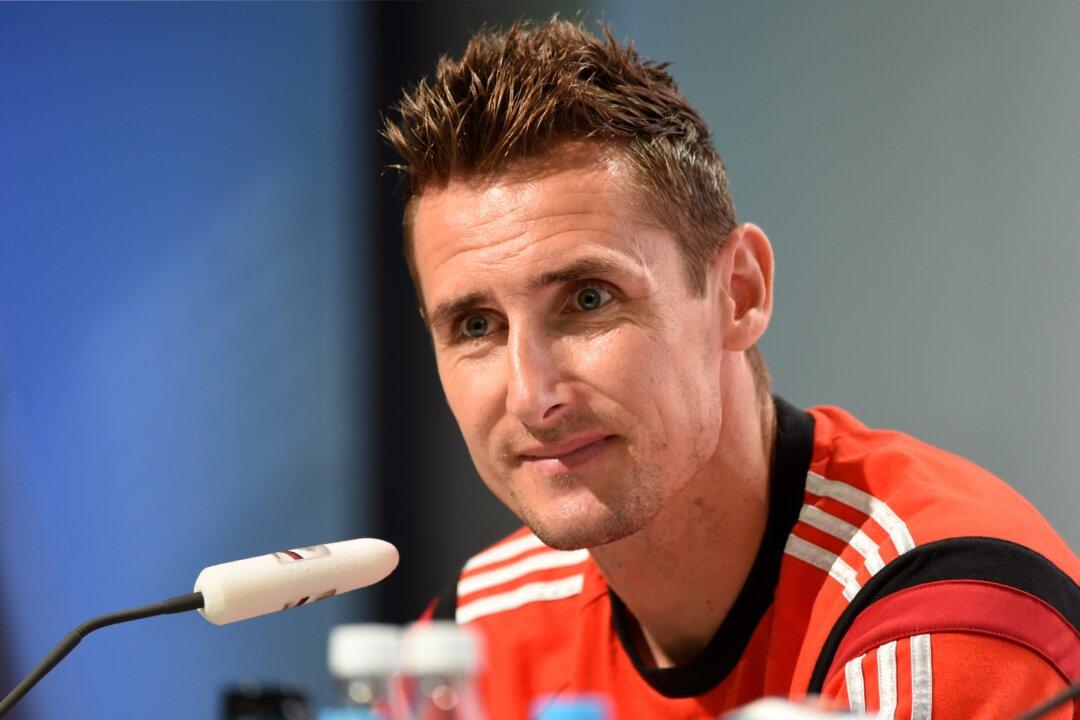World Cup record goal scorer Miroslav Klose wants to win the World Cup.
The 36-year-old German striker broke the World Cup scoring record with his 16th goal against Brazil in the semi final.
“It’s a hugely emotional thing for me, but people who know me, know that my focus is already on Argentina -- 100 per cent,” Klose said in a press interview when asked about the goal.
“Yes, I have overtaken Ronaldo as the best goalscorer, but that is something to take on board another day.
“If we lose the final, my joy as the top scorer will be significantly dampened.
Klose addd, “We enjoyed the game against Brazil, but we ticked it off after 24 hours.
“In the next game, we have to again play to the best of our abilities.
“It feels really awful to lose a final, so it’s our time to win this one.”
See an AP story below.
World Cup Final: Magical Messi or United Germany?
RIO DE JANEIRO (AP) — The most entertaining World Cup in a generation comes down to a final match that pits the planet’s best player against the tournament’s best team.
Lionel Messi will lead Argentina out against Germany at Maracana Stadium on Sunday for a game that will define careers, cement legacies and be watched by a global audience of about a billion viewers.
And it’s a matchup that means more to both sides than just a chance to lift one of the most hallowed trophies in sports.
For Messi, it’s a chance to firmly make his case for being perhaps the greatest ever to play the world’s most popular game. For Germany, it’s an opportunity to make up for a number of near-misses over the last decade and re-establish itself as the dominant force in international football.
And then there’s the matter of settling a historical score. Argentina and West Germany played each other in two straight World Cup finals in 1986 and ‘90, games that are well remembered in the sports psyche of both countries. Diego Maradona and Argentina won the first, the Germans took the second. So call this game the tiebreaker.
“At this point who is favorite, who is not, it doesn’t make a difference,” Argentina midfielder Maxi Rodriguez said. “Both teams feel a responsibility to go all the way.”
Most would name Germany as the favorite, especially after its astounding 7-1 drubbing of host Brazil in the semifinals. Argentina only reached the final after eking out a penalty shootout win over the Netherlands following a 0-0 draw through 120 minutes.
Germany also dismantled Argentina 4-0 in the 2010 quarterfinals in South Africa.
“Germany is a great team. What happened to Brazil could happen to any team,” Argentina forward Sergio Aguero said. “(But) we have players who can create danger up front. We’re in the final for a reason.”
One thing speaks against Germany, too. No European team has ever won a World Cup played in the Americas. Whether that’s because of the climate, the fan support or something else, Germany thinks it can buck the trend.
“We are looking forward to playing a South American team in South America but we hope the Brazilian fans will be supporting us,” Germany assistant coach Hansi Flick said. “We know the Argentina team very well, we’ve played often against them. We know what to expect.”
The question is, what can Argentina expect from Messi?
For Argentina to have a chance, the Barcelona forward will have to perform considerably better than he did against the Netherlands, when he was hardly visible for most of the game.
The four-time world player of the year scored four goals in the three group games but is on a three-game scoring drought in the knockout stages — including two extra time periods. While fellow forwards Gonzalo Higuain and Sergio Aguero are both capable of deciding big games themselves, and the team’s defense has looked surprisingly solid, it’s hard to see Argentina winning without a big contribution from Messi.
For Germany, the equation is equally simple: If it can contain Argentina’s biggest threat, its superior strength in the rest of the field should make the difference. From goalkeeper to center forward, Germany is a team without a weakness. With the exception of an erratic performance against Algeria in the second round, Germany has played like a perfect team machine, getting goals from defenders, midfielders and forwards alike.
“We'll have to keep with Messi constantly and try to disturb him,” Germany forward Thomas Mueller said. “It will be important to act as a unit.”
Germany has not won a major tournament since the 1996 European Championship, losing in the final of the 2002 World Cup and Euro 2008. It was knocked out in the semifinals at both the 2006 and 2010 World Cups, and Euro 2012.
Forward Miroslav Klose, who scored his record 16th World Cup goal against Brazil in the semifinals, is the only player who remains from that 2002 team.
“I don’t want to lose another final,” Klose said. “I want to lift the cup.”
Regardless of what happens, Klose’s legacy is already secure as the tournament’s all-time top scorer. To say Messi’s will be defined by one game is an exaggeration, but the World Cup trophy is the only thing that currently separates him from the likes of Pele and Maradona in the echelon of all-time greats.
If he lifts it on Sunday, he'll join them for good. Maybe even as the best of them all.




